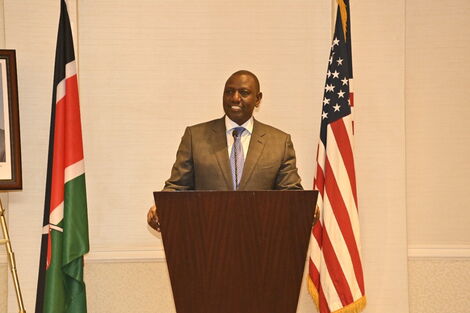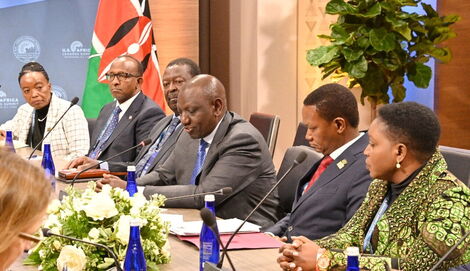-
President William Ruto and First Lady Rachel Ruto meeting US President Joe Biden and his wife Jill Biden at White House on December 15, 2022.TWITTER HUSSEIN MOHAMMED
-
President William Ruto has already secured six major deals for Kenya that will be realised through partnerships with the United States (US) Government as well as private investors.
The deals were secured on Thursday, December 15, during US-Africa Leaders’ Summit.
Some of the deals are set to benefit Kenya directly while others are meant to bring democracy, peace, and stability to the Sub-Saharan Africa region.
One of the key deals is a partnership with World Bank on various economic projects.
 President Ruto addressing Kenyans in diaspora at Washington DC on December 15, 2022 TWITTER STATE HOUSE KENYA
President Ruto addressing Kenyans in diaspora at Washington DC on December 15, 2022 TWITTER STATE HOUSE KENYA“Kenya will intensify its engagement with the World Bank on the country development priorities,” Ruto announced on Thursday, December 15, in Washington DC during a meeting with World Bank President David Malpass.
The President also secured a major partnership in his efforts to bring peace at the Democratic Republic of Congo (DRC).
In a meeting attended by Yoweri Museveni (Ugandan President), Paul Kagame (Rwanda), Samia Suluhu (Tanzania), and Evariste Ndayishimiye (Burundi), the president on December 15, charted a way forward towards achieving peace and stability at DRC.
“It is in our interest as a region to find a lasting solution to the current instability in the DRC. We cannot allow the situation to get worse," the President urged other Heads of State.
Kenya will be one of the first African countries to make strides in space technology.
This was announced by the president after he was hosted at a high-level roundtable at Arizona State University’s Thunderbird School of Management by US investors on December 15.
During the same meeting, it was announced that Kenya would partner with the US on climate innovations and carbon removal.
The President painted Kenya as one of the most favourable investment destinations for the abundant US capital.
He attributed that to its competitive advantage to a maturing constitutional democracy and well-developed financial and commercial ecosystem.
Lastly, the President has secured a huge deal toward attaining peace in the Horn of Africa which will benefit Kenya as the country has been hurt economically by terrorist attacks by Al Shabaab.
"The United States of America will work with Kenya to ensure there is peace in the Horn of Africa," the President announced during a meeting with US Secretary of State Antony Blinken on December 15.
 President William Ruto during talks with U.S. Secretary of State Antony Blinken at Washington DC on December 15, 2022 TWITTER WILLIAM RUTO
President William Ruto during talks with U.S. Secretary of State Antony Blinken at Washington DC on December 15, 2022 TWITTER WILLIAM RUTO






